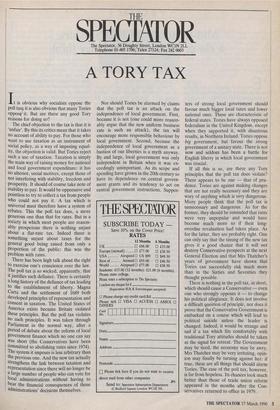SPECT THE AT OR
The Spectator, 56 Doughty Street, London WC1N 2LL Telephone 01-405 1706; Telex 27124; Fax 242 0603
A TORY TAX
It is obvious why socialists oppose the poll tax it is also obvious that many Tories oppos•V it. But are there any good Tory reasons for doing so?
The chief objection to the tax is that it is `unfair'. By this its critics mean that it takes no account of ability to pay. For those who want to use taxation as an instrument of social policy, as a way of imposing equal- ity, the objection is valid. But Tories reject such a use of taxation. Taxation is simply the main way of raising money for national and local government expenditure: it has no ulterior, social motives, except those of not interfering with stability, freedom and prosperity. It should of course take note of inability to pay. It would be oppressive and pointless to try to collect a tax from people who could not pay it. A tax which is universal must therefore have a system of rebates. This the poll tax does, a more generous one than that for rates. But in a society in which most people are reason- ably prosperous there is nothing unjust about a flat-rate tax. Indeed there is something unjust about taxes for the general good being raised from only a proportion of the public: this was the problem with rates.
There has been high talk about the right to exercise one's conscience over the law. The poll tax is so wicked, apparently, that it justifies such defiance. There is certainly a long history of the defiance of tax leading to the establishment of liberty. Magna Carta and the settlement of 1689 both developed principles of representation and consent in taxation. The United States of America exists because Britain violated these principles. But the poll tax violates no such principles. It was taken through Parliament in the normal way, after a period of debate about the reform of local government finance which no one can say was short (the Conservatives have been committed to abolishing rates since 1974). The system it imposes is less arbitrary than the previous one. And the new tax actually strengthens the link between taxation and representation since there will no longer be a large number of people who can vote for local administrations without having to bear the financial consequences of those administrations' decisions themselves. Nor should Tories be alarmed by claims that the poll tax is an attack on the independence of local government. First, because it is not (one could more reason- ably argue that the new uniform business rate is such an attack), the tax will encourage more responsible behaviour by local government. Second, because the independence of local government as a bastion of our liberties is a myth anyway. By and large, local government was only independent in Britain when it was ex- ceedingly unimportant. As its scope and spending have grown in the 20th century so have its dependence on central govern- ment grants and its tendency to act on central government instructions. Suppor-
ters of strong local government should favour much bigger local taxes and lower national ones. These are characteristic of federal states. Tories have always opposed federalism in the United Kingdom, except when they supported it, with disastrous results, in Northern Ireland. Tories oppose big government, but favour the strong government of a unitary state. There is not now and seldom has been a battle for English liberty in which local government was crucial.
If all this is so, are there any Tory principles that the poll tax does violate? There appears to be one — that of pru- dence. Tories are against making changes that are not really necessary and they are wary of anything which is very dangerous. Many people think that the poll tax is unnecessary and dangerous. As for the former, they should be reminded that rates were very unpopular and would have become much more so if their long- overdue revaluation had taken place. As for the latter, they are probably right. One can only say that the timing of the new tax gives it a good chance that it will not destroy Conservative prospects at the next General Election and that Mrs Thatcher's years of government have shown that Tories can successfully risk much more than in the Sixties and Seventies they thought possible.
There is nothing in the poll tax, in short, which should cause a Conservative — even one who strongly opposes it — to change his political allegiance. It does not involve a difficult question of principle, nor does it prove that the Conservative Government is embarked on a course which will lead to political suicide unless the leader is changed. Indeed, it would be strange and sad if a tax which fits comfortably with traditional Tory attitudes should be taken as the signal for retreat. The Government may be tired, the economy may be awry, Mrs Thatcher may be very irritating, opin- ion may finally be turning against her: if true, these are all things that should alarm Tories. The case of the poll tax, however, is far from hopeless. Its chances look much better than those of trade union reform appeared in the months after the Con- servatives returned to office in 1979.


























































 Previous page
Previous page